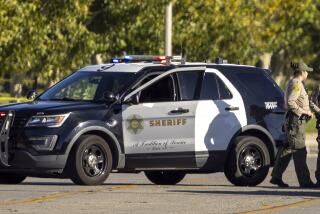Deputy, 35, Shot by Fellow Officer Dies
- Share via
A sheriff’s deputy died at Los Angeles County Harbor-UCLA Medical Center on Tuesday, six days after another deputy accidentally shot him in the neck as they confronted a man firing a pellet gun, officials said.
The Sheriff’s Department said Michael R. Arruda, 35, a 13-year veteran of the force, was believed to be the first deputy fatally shot by a colleague.
For the record:
12:00 a.m. June 17, 2004 For The Record
Los Angeles Times Thursday June 17, 2004 Home Edition Main News Part A Page 2 National Desk 2 inches; 82 words Type of Material: Correction
Slain deputy -- An article in Wednesday’s California section said the Los Angeles County Sheriff’s Department believed that Deputy Michael R. Arruda, who died Tuesday of a gunshot wound suffered a week ago, was the first deputy accidentally shot and killed by a colleague. He was the third. In 1981, reserve Deputy Constance Worland was slain when her partner accidentally discharged a shotgun. In 1982, Deputy Kenneth Ell was killed by a ricocheting bullet fired at an assault suspect by another deputy.
“The Sheriff’s Department has lost a valiant deputy sheriff who will be deeply missed but never forgotten,” Sheriff Lee Baca said. “He loved doing what he did, protecting the people of Los Angeles County.”
Arruda was one of four deputies who went to a Motel 6 in Hacienda Heights on June 9 after receiving a call that someone was firing shots and threatening people, officers said.
When they arrived at the door of the second-floor unit, 51-year-old Paul Smith of Whittier “came out blazing,” Sheriff’s Capt. Ray Peavy said.
Officers said Smith’s pellet pistol closely resembled a .40-caliber semiautomatic handgun and, in the heat of the moment, the deputies could not distinguish it from the real thing.
Deputies returned fire. Smith was killed, Arruda was hit in the neck and another deputy was struck by a pellet but not seriously wounded.
Peavy said Arruda may have been dodging one of Smith’s pellets and placed himself in the line of fire.
The department’s office of independent review said training procedures could be changed because of the accident.
“Weapons are deadly instruments that are used to protect the public,” Baca said. “But we are reminded in the death of Deputy Arruda that by using these tools, we can also harm ourselves.”
The name of the officer who shot Arruda has not been released.
He and the other deputies involved in the shootout have been removed from active duty and were receiving counseling to help them deal with the incident, Baca said.
“This is a very, very tough time for all of us in the Sheriff’s Department,” Baca said. “We are all in mourning. His family is in mourning. The county is in mourning.”
Officials don’t know what motivated Smith to shoot. He had lived in the motel for a year after losing his home and his job two years before, Peavy said. He had no criminal record. He had purchased the pellet gun the day of the shooting, as well as a hunting knife.
“It’s likely, based on his actions, that he was bent on dying and chose to have some peace officers do that for him,” Peavy said.
Arruda, born in New Bedford, Mass., served four years in the Navy before joining the Sheriff’s Department in May 1991. He spent more than eight years as a guard at the Men’s Central Jail before transferring to the Industry sheriff’s station in January 2000.
Described by his supervisors as “an outstanding, hard-working, reliable, diligent team player,” Arruda had received numerous commendations for his work in school safety and family services.
Friends described him as an avid weight-lifter and runner who had participated in the annual law enforcement Baker-to-Las Vegas relay race.
The father of an 11-year-old boy, Michael Jr., Arruda was looking forward to the birth of his second child, friends said. They said he and his fiancee, Sheriff’s Sgt. Lydia Silva, had chosen the name Savannah for the daughter, expected in about two months.
Baca said Arruda had an enthusiasm for people, for life and for his job.
“No job was too big,” Baca said. “And no responsibility was too small.”
*
Associated Press contributed to this report.
More to Read
Sign up for Essential California
The most important California stories and recommendations in your inbox every morning.
You may occasionally receive promotional content from the Los Angeles Times.













